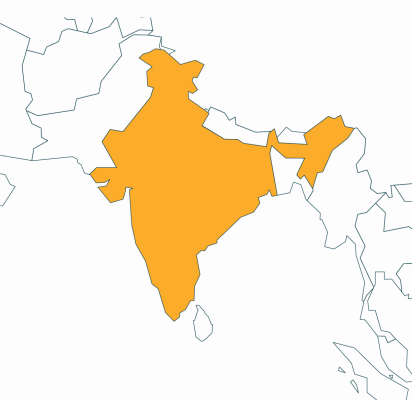Project Title | IRC Role | Country: State | Duration |
Drink from Tap Mission (2019-2020) | IRC supported the development of the communication strategy, which highlights the key elements of the service that needs to be communicated by WATCO and the possible channels that can be used for this communication. https://www.ircwash.org/projects/drink-tap-mission | India: Odisha | 2 years |
Innovation Hub for Urban Water, Sanitation and Hygiene Solutions in India (IHUWASH) (2016-2019) | IHUWASH is a USAID-funded collaborative initiative of the National Institute of Urban Affairs (NIUA), TARU Leading Edge, IRC and Ennovent. IRC is responsible for conducting rapid water and sanitation assessments in the 3 cities and capacity strengthening of city and state officials. https://www.ircwash.org/projects/ihuwash | India: Haryana (Faridabad), Karnataka (Mysore) and Rajasthan (Udaipur) | 3 years |
Watershed (2016-2020) | Strengthening civil society capacity for lobbying and advocacy for universal WASH services. Project page: http://www.ircwash.org/projects/watershed | India | 5 years |
Safe Water Phase II (2015-2018) | This is a three year initiative (2015-2018) aiming to increase access to safe water particularly for people living at the base of the economic pyramid (BOP). Project page: http://www.ircwash.org/projects/safe-water-phase-2 | India: Odisha and Delhi | 3 years |
Community Water Plus (2012-2015) | Support to community-managed rural water supplies; IRC supported the general methodology and did two case studies; training module development
http://www.ircwash.org/projects/india-community-water-plus-project | India: Uttarkhand and West Bengal | 3 years |
Case study on the Business of the Bangalore Honey Suckers (2012) | Review and oversight of the case study, available online: http://www.ircwash.org/news/india-bengaluru-business-honey-suckers | India: Karnataka (Bangalore) | 6 months |
QIS workshop in Bhopal (2011) | Monitoring. Co-organiser with WaterAid India
Presentation: http://www.slideshare.net/ircuser/photo-slide-show-qis-workshop-bhopal-india-2007-404880 | India: Madhya Pradesh | 1 week |
Triple-S in India Study and 2-3 roundtables | Study different service delivery models Facilitate sector working group on sustainability | Maharashtra, Kerala, Gujarat, Karnataka, Tamil Nadu, Uttaranchal | 1 year |
MASSMUS (2011) | Case study on the domestic use of large-scale irrigation systems | India: Andhra Pradesh | 2 weeks |
WASHCost (2007-2012) | Study on life-cycle costs of rural WASH:
Briefing Notes
http://www.ircwash.org/resources/washcost-india-briefing-notes
Training module on assessing unit costs:
http://www.ircwash.org/resources/training-module-assessing-unit-costs-andhra-pradesh-india | India: Andhra Pradesh | 4 years |
MUS Project (2008) | This included a case study in India, which was done by iDE, but IRC had a general synthesis role, through which also the India case was brought forward | India: Maharashtra | 4 years |
Women, Wellbeing, Work, Waste and Sanitation (4WS) (2003-2006) | Sanitation & gender. IRC led this multi-country applied research. Indian partners: University of Kerala, SEUF. See conference paper: http://www.ircwash.org/resources/women-well-being-work-waste-and-sanitation-4ws | India: Kerala | 36 months |
Negotiating peri-urban water conflicts (NEGOWAT) (2003-2006) | Water security. Multi-country research project in collaboration with Natural Resources Institute (NRI) at University of Greenwich. Indian partner: Madras Institute of Development Studies http://negowat.cirad.fr/Docs4Web/negowat-book-final-eng/negowat-book-final.pdf | India: Chennai, Tamil Nadu | 3 years |
Water Audits (2003) | http://projects.nri.org/wss-iwrm/Reports/APRLPwra/APRLPwra_fullA4.pdf http://projects.nri.org/wss-iwrm/Library/KAWAD_water_audit.PDF | India: Andhra Pradesh
India: Karnataka
| 1 year
1 year |
Junior Professional Officer (JPO) programme (2001-2006) | Capacity building. Indian partner 3rd phase 2004-2006: SEUF. Explanation online: http://www.ircwash.org/news/overview-jpo-programme | India: Kerala | 32 months |
School WASH (2000-2004) | Advisory services to UNICEF + Gov’t. Training. Materials. See proposal: http://www.ircwash.org/resources/india-school-sanitation-and-hygiene-education-school-sanitation-support-sss-project | India | Over 4 years |
WHiRL(2000-2004) | Local water resource management http://projects.nri.org/wss-iwrm/reports.htm | India: Andhra Pradesh | 3 years |
Local Water Resource Management | Water governance case study | India: Andhra Pradesh | 2 months |
Advisory services DGIS project Gujarat | Hygiene promotion, gender | India: Gujarat | 2 missions, over 2 years |
Resource Centre Development Program (2000-2006) | Support sector learning/develop state WASH resource centres | India: Gujarat, Kerala, Uttaranchal | 2 years |
Sustaining changes in hygiene behaviour (2000-2003) | Hygiene. IRC led this multi-country applied research. Indian partner: SEUF. See report: http://www.ircwash.org/resources/sustainability-changes-hygiene-behaviour-kerala-india-sustaining-changes-hygiene-behaviour | India: Kerala | 42 months |
Development of District scoping for rural water supply (1999– 2002) | Participatory district planning | India: 9 Districts in different States | 2 years |
Integrated Research and Demonstration Project on Slow Sand Filtration (SSF) (1975-1989) | Technology. IRC led a multi-country applied research programme. NEERI was our Indian partner | India: Andhra Pradesh, Haryana, Maharashtra and Tamil Nadu, | Four phases over a period of 14 years |

 IRC in India at a glance
IRC in India at a glance